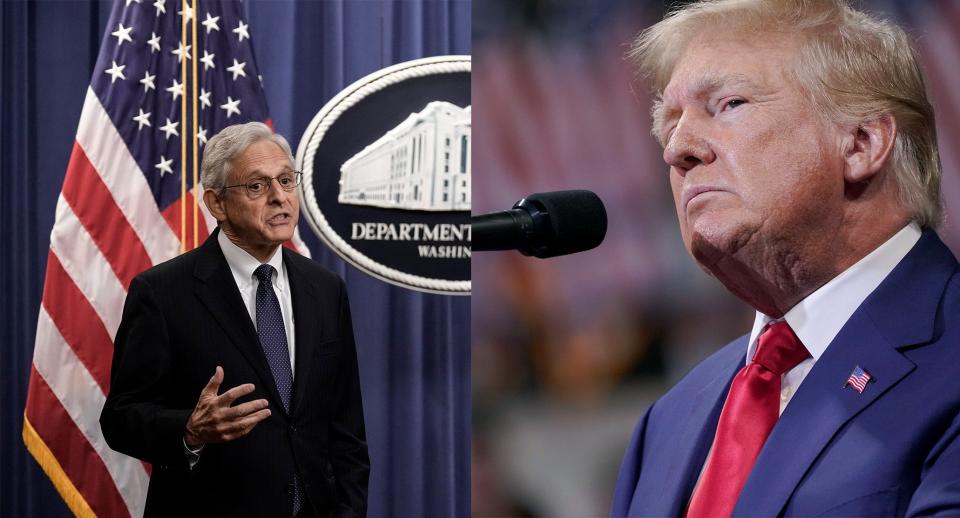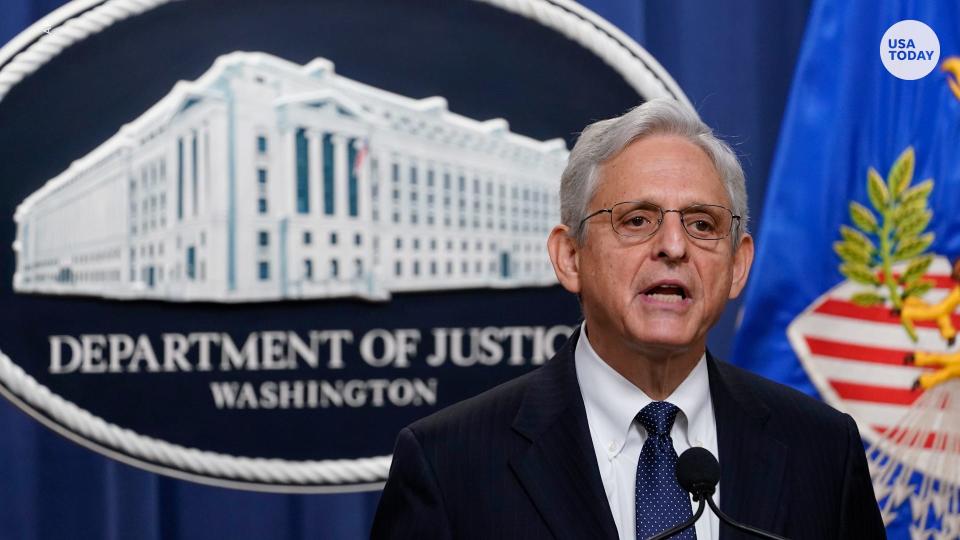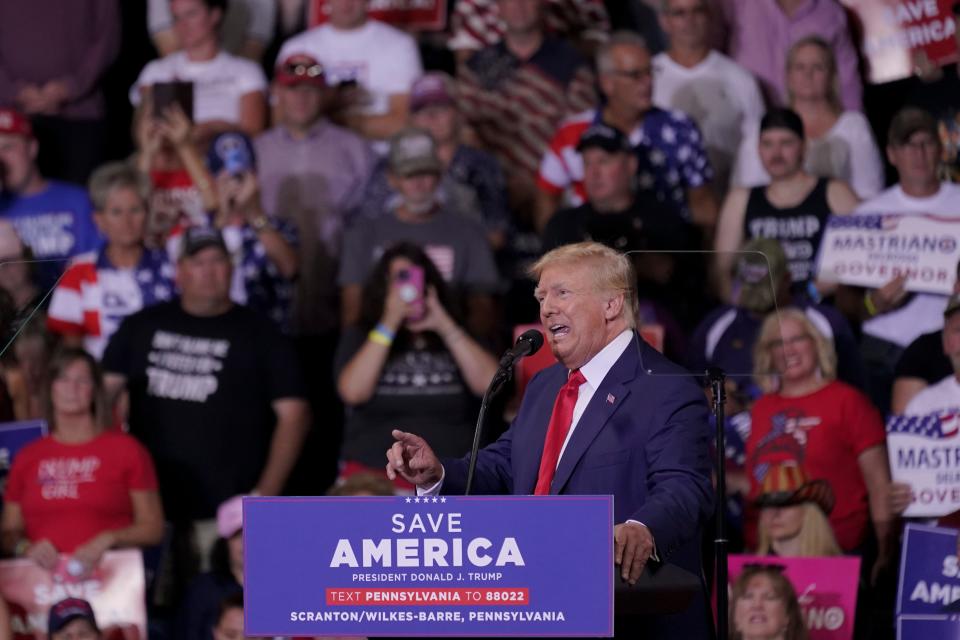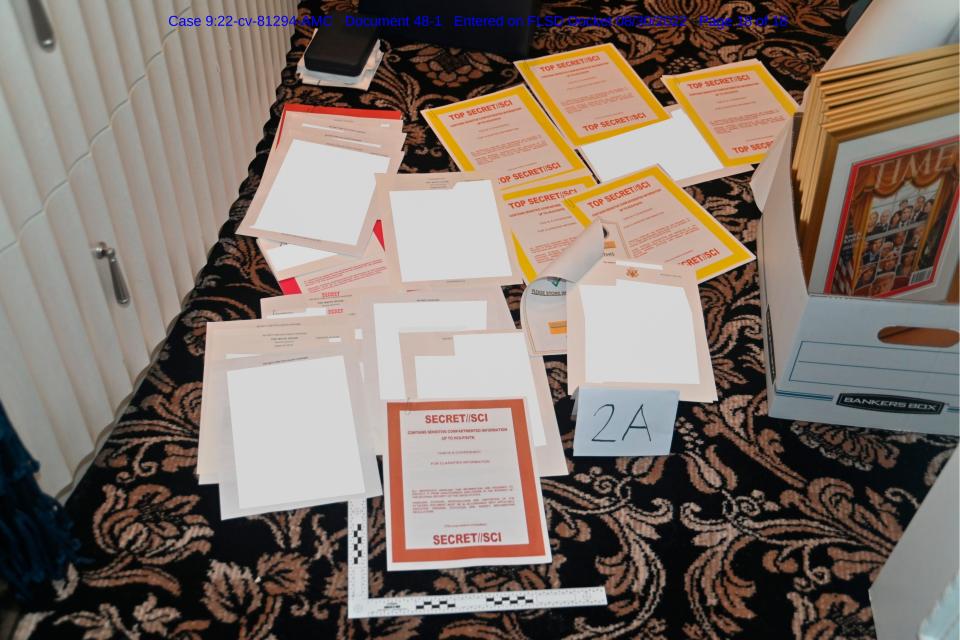Prosecution vs. politics: Can AG Garland pursue Trump probes without influencing the midterms?
- Oops!Something went wrong.Please try again later.
- Oops!Something went wrong.Please try again later.
WASHINGTON – As campaigns for the 2022 midterms and the investigations of Donald Trump each heat up, legal and political experts say Attorney General Merrick Garland must walk a tightrope between the two.
How does he oversee the inquiries without appearing to influence the elections?
Federal prosecutors traditionally try to avoid public disclosure of investigative steps in a political case within 60 days before an election. But a government watchdog debunked the policy in 2018, saying there is no Justice Department rule or regulation to delay investigations, just an informal practice.
Trump isn’t a candidate – yet. But he holds great influence over his supporters and his endorsements are coveted. He’s denied wrongdoing and said Thursday that there would be unspecified “big problems” if he were indicted.
Garland has said repeatedly he would pursue the investigations wherever the facts and law lead. He’s also cautioned staffers against appearing to interfere with politics.

President Joe Biden has mostly avoided commenting on the Trump probes. But when Biden said last October that witnesses should be prosecuted for defying subpoenas from a House committee investigating the Capitol attack on Jan. 6, 2021, Justice Department spokesman Anthony Coley pushed back.
The department would "make its own independent decisions in all prosecutions based solely on the facts and the law," he said. "Period. Full stop."
Federal investigations appeared to gather steam in recent weeks. A flurry of subpoenas from a D.C. grand jury into issues such as fake electors in the 2020 election and Trump's fundraising after his loss. Prosecutors called the inquiry into documents seized at Mar-a-Lago urgent because dozens of records were marked classified.
But a federal judge paused the department's criminal investigation while a special master reviews the records. Legal experts say any potential indictment of Trump or top aides is unlikely before the Nov. 8 election because grand juries are gathering evidence and witness testimony. Of course, if Trump declares himself a candidate for president in 2024 in the next eight weeks, that complicates the political calculations.
“They’re walking a fine line here between the midterms and the declaration of presidential candidates for 2024," Claire Finkelstein, a law and philosophy professor at the University of Pennsylvania and founder of the Center for Ethics and the Rule of Law, told USA TODAY. “I think that’s very, very tricky."

'Unwritten' DOJ policy avoids political indictments 60 days before elections
The risk that an investigation could influence an election was illustrated in 2016. Then-FBI Director James Comey announced days before the election that he was reopening an investigation into Democratic presidential nominee Hillary Clinton’s emails. She then lost to Trump.
Michael Horowitz, the Justice Department’s inspector general at the time, reported on a tradition of an “unwritten 60-day rule” for delaying overt investigative steps close to an election. But he found the practice was "not written or described in any Department policy or regulation."
Former Attorney General Loretta Lynch told Horowitz’s team the general practice was not to take actions that might have an impact on an election, even if it wasn't an election case. Matt Axelrod, a former principal associate deputy attorney general, said there wasn’t a 60- or 90-day rule, but “the closer you get to the election, the more fraught it is.”
The Justice Department has prosecuted Trump aides straddling that time frame. Political strategist Steve Bannon was convicted in July of contempt for defying a subpoena from the House Jan. 6 committee for documents and testimony. Peter Navarro, a former Trump trade adviser, faces trial on similar charges Nov. 16.
Kevin O’Brien, a former assistant U.S. attorney now at Ford O'Brien Landy LLP, told USA TODAY the Justice Department shouldn’t handicap its investigation with a non-binding tradition. Even if Trump were indicted in January, sharing evidence and debating issues could easily delay a trial until November 2024, O’Brien said.
“That would be disastrous for the country, if only because Trump would be free to run for president again,” O’Brien said. "The time left on the clock is beginning to cast a shadow on the Trump investigations.”

Garland: 'No person is above the law'
Garland, a former federal appeals court judge, has said repeatedly he would follow investigations wherever the facts and the law lead. He has also taken steps to avoid the perception of political interference in investigations.
More than a year ago, Garland restricted contacts between the White House and the Justice Department. The Senate Judiciary Committee plans to investigate whether the Trump White House meddled with the department, after revelations in a new book from a former federal prosecutor, Geoffrey Berman.
Garland issued new restrictions last month against department appointees attending partisan political events even in their personal capacities. Garland said that "under the new policy, noncareer appointees may not participate in any partisan political event in any capacity."
The attorney general's efforts to keep his agency apolitical come as FBI agents seized 11,000 documents during a search of Mar-a-Lago on Aug. 8, including 54 marked “secret” and 18 “top secret.”
Garland, who personally approved the search, said the department never announced the operation – Trump did – and didn't make the decision lightly. The search came after Trump surrendered 15 boxes of documents including classified records in January and federal authorities retrieved more classified documents under subpoena on June 3.
“Much of our work is by necessity conducted out of the public eye,” Garland said of the inquiry on Aug. 11. “We do that to protect the constitutional rights of all Americans and to protect the integrity of our investigations.”
Democratic lawmakers and some legal experts questioned the pace of the investigations more than a year and a half after Trump left office. But Garland has said repeatedly he would pursue investigations regardless of the target.
“No person is above the law in this country,” Garland told reporters July 20. “I can’t say it any more clearly than that. There is nothing in the principles of prosecution and any other factors which prevent us from investigating anyone – anyone – who is criminally responsible for an attempt to undo a democratic election.”

Legal expert: Investigations on 'full boil'
For lack of Justice Department announcements, indirect clues suggest investigations are heating up on multiple fronts.
Dozens of subpoenas went out to Trump aides recently in the probes of fake electors and Trump fundraising after the 2020 election.
But the department didn’t announce the subpoenas or comment on them.
“This has bubbled along at a very low level and suddenly we’re on full boil," said Finkelstein, the law professor. "I don’t think there will be any less investigations."
Prosecutors have argued the investigation of documents seized at Mar-a-Lago is urgent because classified records were involved. But U.S. District Judge Aileen Cannon ordered the Justice Department on Sept. 5 to temporarily halt its review of the documents as part of the criminal probe while a special master reviews the records for personal papers or those falling under attorney-client privilege.
The department appealed her pause in the probe, aiming to revive investigative access to about 100 classified documents, but accepted the special master. If the appeals court doesn't lift the pause while the case is argued, the litigation could take months or longer to be resolved.
“It throws a pretty serious monkey wrench into the investigation and quite an illegitimate one," Finkelstein said.
Ross Baker, a political science professor at Rutgers University, called Garland "a bit like a chef preparing a dish no one will find unpalatable."
"His acceptance of the special master candidate put forth by Trump’s lawyers is one example of the delicate seasoning game he is using," Baker told USA TODAY. "Evenhandedness is the most prominent seasoning on Garland’s spice rack."
Trump warns of 'big problems' for country if indicted
Trump remains popular among his political base among the Republican Party. Eight of the 10 House Republicans who voted to impeach him have either retired or lost primary elections.
But it’s not clear whether that will translate into general election victories with Senate GOP nominees he's endorsed: Blake Masters in Arizona, Herschel Walker in Georgia, Mehmet Oz in Pennsylvania and J.D. Vance in Ohio.
The Senate: Control of the Senate is now a coin flip: These are the 7 midterm election races to watch
Trump blasted the investigations repeatedly as hoaxes, witch hunts and partisan scams. Trump told Hugh Hewitt on his radio show Thursday that he had verbally declassified all the sensitive documents found at Mar-a-Lago.
“I did absolutely nothing wrong,” said Trump who added he would only be indicted “if they are just sick and deranged, which is always possible ... They’ve weaponized the Department of Justice and FBI.”
But national security experts have said declassification doesn’t work that way because agencies dealing with the secret information must be notified to protect their sources. Prosecutors have said they found no documentation of declassification. And prosecutors said it wouldn’t matter for criminal charges because the Espionage Act deals with mishandling defense records even if they aren’t classified.
Threat environment: Durbin: Trump, allies bear blame for 'stunning' rise in threats against FBI since Mar-a-Lago search
Trump also told Hewitt that organizing alternate electors was routine in past presidential campaigns.
But state officials who authorize legitimate electors called the strategy “insane and inappropriate," as Laura Cox, former Michigan Republican Party chair, told House investigators. A federal judge ruled in a civil case Trump “more likely than not” acted unlawfully in the scheme he called a coup in search of a legal justification.
Trump said an indictment could spark “big problems” across the country. But he said he could run for president in 2024 even if he is indicted.
“If a thing like that happened, I would have no prohibition against running,” said Trump, who was impeached in the House last year for inciting the Capitol attack but acquitted by the Senate. “If it happened, I think you’d have problems in this country the likes of which we have never seen before. I think they’d have big problems.”
This article originally appeared on USA TODAY: A test for Garland: Trump investigations heat up as election looms

